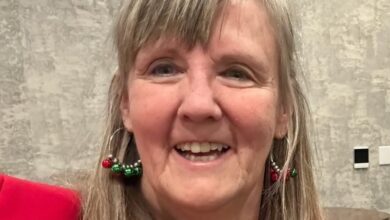Campaign to Fight Human Trafficking by Cutting Demand for Prostitution
A new awareness campaign in Kansas is aimed at cutting the demand for prostitution as a way to fight human trafficking. The campaign involves state agencies and local advocacy groups teaming up to push the Demand an End initiative. Kansas has joined 10 other states in the campaign, which involves education and announcements warning people that buyers of sex face charges, as well as the sellers.
Kansas Attorney General Derek Schmidt, at a press conference at the Capitol building, said that the campaign wants to create a culture where buying sex is not acceptable. He said it’s not a victimless crime. The aim is to curb the cultural appetite for enslaving and purchasing people for sex.
“The money goes somewhere,” he said. “It fuels a marketplace.
“That in turn enables traffickers and exploiters to do to human beings things that are unlawful and wrong.”
Barry Feaker, executive director of the Topeka Rescue Mission, has been at the forefront of the orchestrating of a plan to understand the extent of the sex marketplace in Shawnee County and how to deal with it. He hopes the effort will become a model for other communities. He joined other civic leaders and state officials at the press conference as they called for public awareness for the victims of human trafficking.
“There are people getting ready tonight, or being made ready, to service people who are going to use them for labor or sexual exploitation,” Feaker said. “Right now, there are young women and some young men who are being shot with methamphetamine to numb their pain, so they will just serve.
“Right now, there are some who are saying, ‘Nobody is there for me. There is nobody.’ They don’t know what we are doing here today because they are isolated. Some are in basements. Some are even in boxes. Some are in vehicles. Some are at homes within walking distance of this room, right now, as we speak.”
Feaker said the rescue mission in Topeka rescued 131 victims of sex trafficking last year but then had to transport 17 of them to safe houses around the country because of the lack of a restoration program in Shawnee County. These victims need therapy and rehabilitation, he said.
It’s time to demand justice, Feaker said, noting that the foundation has been laid and now the heavy lifting must begin.

State-wide effort
Kristy Childs founded the group Veronica’s Voice, based in Kansas City, Kansas, which helps victims of human trafficking. Childs said people might not understand that buyers of sex encompass a wide variety of people, including people from higher-income communities.
“Every time I would go out and speak in a church, any kind of mixed crowd, I know I’m speaking to some buyers,” she said.
An example in the Kansas City area, she said, is that many buyers come from Johnson County, people she hopes the campaign can reach.
“The people that have the disposable income,” Childs said. “They have the choice in the matter.”
Karen Countryman-Roswurm, executive director of the Center for Combating Human Trafficking at Wichita State University, said educational campaigns like this are needed to help shift perceptions. She said it could start with simple changes in how people act.
“It takes men and women saying, ‘Hey, let’s not make a joke about that person and what they’re wearing,’” she said.
However, there needs to be more work done to make sure victims of human trafficking aren’t also charged with crimes. By a large margin, she said, people selling sex face more penalties than do buyers of sex.
“The reality is right now there are people losing their lives behind bars even though they were victimized by this crime,” Countryman-Roswurm said.
Changes in Kansas Law
Kansas has made changes to state law in recent years to help victims of human trafficking fend off criminal charges. Schmidt said they could offer a defense that they aren’t criminally liable because they are victims of human trafficking.
He said more training for attorneys could help put the law to better use.
“I think there’s a great opportunity to make progress,” he said, “by ensuring the tools already available are well used.”
Schmidt said it is imperative that we create a culture where the buying and selling of human beings is not tolerated.
– Stephen Koranda | Kansas Public Radio/Kansas News Service contributed to this report
Kansas churches will offer “sanctuary,” break Federal Law








